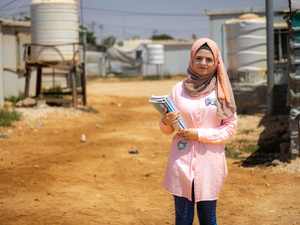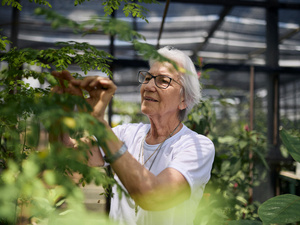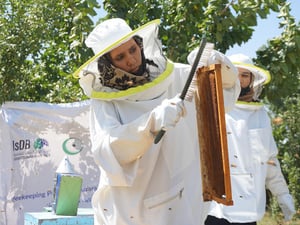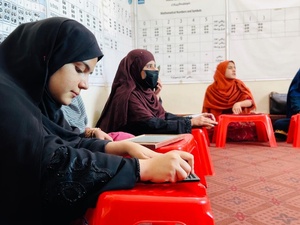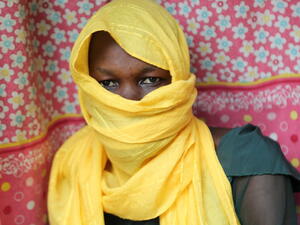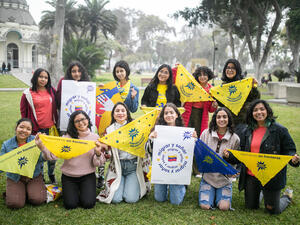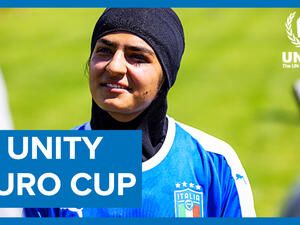A proud Iraqi laments violence against women from her Spanish exile
A proud Iraqi laments violence against women from her Spanish exile
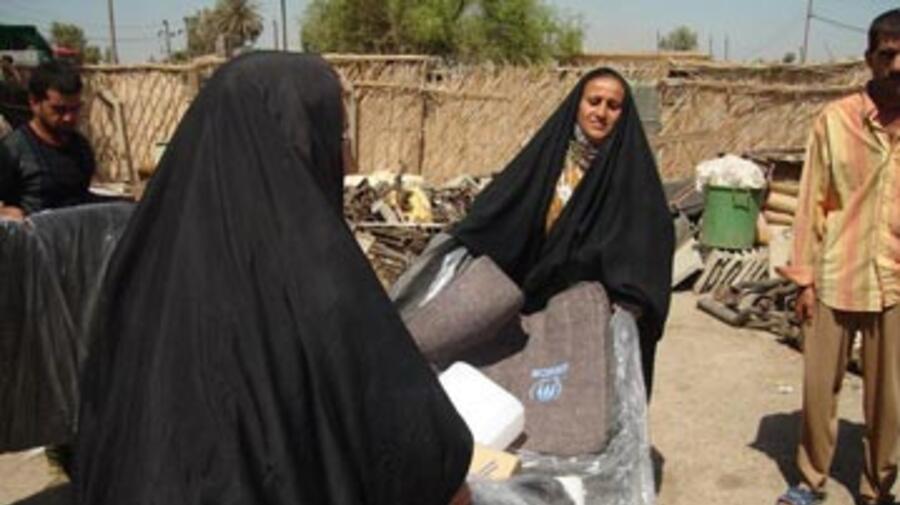
Iraqi women collect aid items during a distribution in Baghdad. Life has become tough for Iraqi women in the past three years, with violence a big problem.
MADRID, Spain, December 6 (UNHCR) - Taiseer* thought things could only get better in her native Iraq after a United States-led invasion force toppled President Saddam Hussein in March 2003. She never dreamed that life would soon change for the worse for the country - especially its womenfolk.
An engineer by training, Taiseer managed to escape Iraq just over two years ago and find refuge in Spain, but she is still haunted by her experiences and by the continuing violence and abuse being suffered by the women left behind.
As evidence of how bad the situation is, the current annual 16-day international campaign to eliminate violence against women is virtually being ignored in Iraq - it is simply too dangerous for women and their supporters to put their heads above the parapet.
It would have been difficult for anyone to imagine that things could get worse for Iraq when 39-year-old Taiseer was growing up in Baghdad. She lived through the hardship and horrors of the 1980-1988 war with neighbouring Iran, the first Gulf War of 1991 and the subsequent economic isolation of her country.
During these years she lost many members of her family, some were executed by Saddam Hussein's security forces, others died as a result of the fighting. "The smoke was so thick that daylight turned into darkness," Taiseer recalled of the regular missile strikes and bomb blasts.
Taiseer and others rejoiced when US forces swept into Baghdad in 2003, but the joy soon turned to horror and despair as pro-Saddam forces began attacking the occupation troops and sectarian violence broke out between rival Shia and Sunni Muslim militias, engulfing and destroying innocents of both communities.
And amid the escalating culture of violence, things became much worse for women. Thousands have since died in random acts of violence, while many others have become victims of sexual and gender-based violence, including rape and murder. They also became the targets of religious and social conservatives, who were firmly opposed to liberalisation for women.
With anarchy and death stalking the streets of Baghdad and other cities, terrified women like Taiseer - a Sunni Muslim - became prisoners in their own homes. Muslim and even Christian women were being pressured to wear veils and scarves in public, while fewer females dared attend schools and universities.
On a sunny August day in 2003, an armed patrol from an Islamic fundamentalist group beat up Taiseer and a friend for not wearing a veil. "After this episode my father bought some arms to protect me and the rest of my family, while my uncle was supporting the [Islamic fundamentalist] group by saying that women should not go outside alone and should respect social rules and customs," Taiseer said.
"We were discriminated against everywhere, we could not have a normal life," said the young woman, who was threatened by a guard at her workplace because she would not support his application for a post. "He shouted at me, saying: 'Better for you to stay at home as all women should do. I know some armed groups who will be happy to help me kill you and the rest of your family."
A war which was meant to bring democracy and equality, was instead taking the country - and the status of woman - backwards. Taiseer decided to get out.
Leaving her parents, siblings and grandmother behind, she made her way overland to Jordan in May 2004 and then, one month later, flew armed with a visa to the vibrant Spanish city of Barcelona. Taiseer applied for asylum on the grounds that she would face persecution in Iraq - the Spanish authorities have granted her complementary protection status.
"We follow the criteria enhanced in the 1951 [UN Refugee] Convention and also the UNHCR recommendations, according to which complementary protection is given to those Iraqi citizens who are not granted refugees status," explained Julian Prieto, deputy director of Spain's Office of Asylum and Refuge. Spain currently hosts 38 recognised refugees from Iraq and about 3,700 asylum seekers. A further 642 Iraqis hold residency permits.
"I thank Spain for giving me the opportunity to live again as a human being with all my rights," said Taiseer, who lives near Barcelona with a relative. But she still thinks a lot about the violence and inequality suffered by women in Iraq at a time when tens of thousands of Iraqis are fleeing their country or homes every month. The violence has followed the women, say UNHCR staff, who have reported cases of sexual and gender-based violence in neighbouring countries.
"Stories of abduction and rape create a great sense of fear in the minds of Iraqi women. Not only is there a threat of being sexually assaulted, women also fear the aftermath of such assaults," Taiseer said.
* Name changed for protection reasons
By Francesca Fontanini in Madrid, Spain

